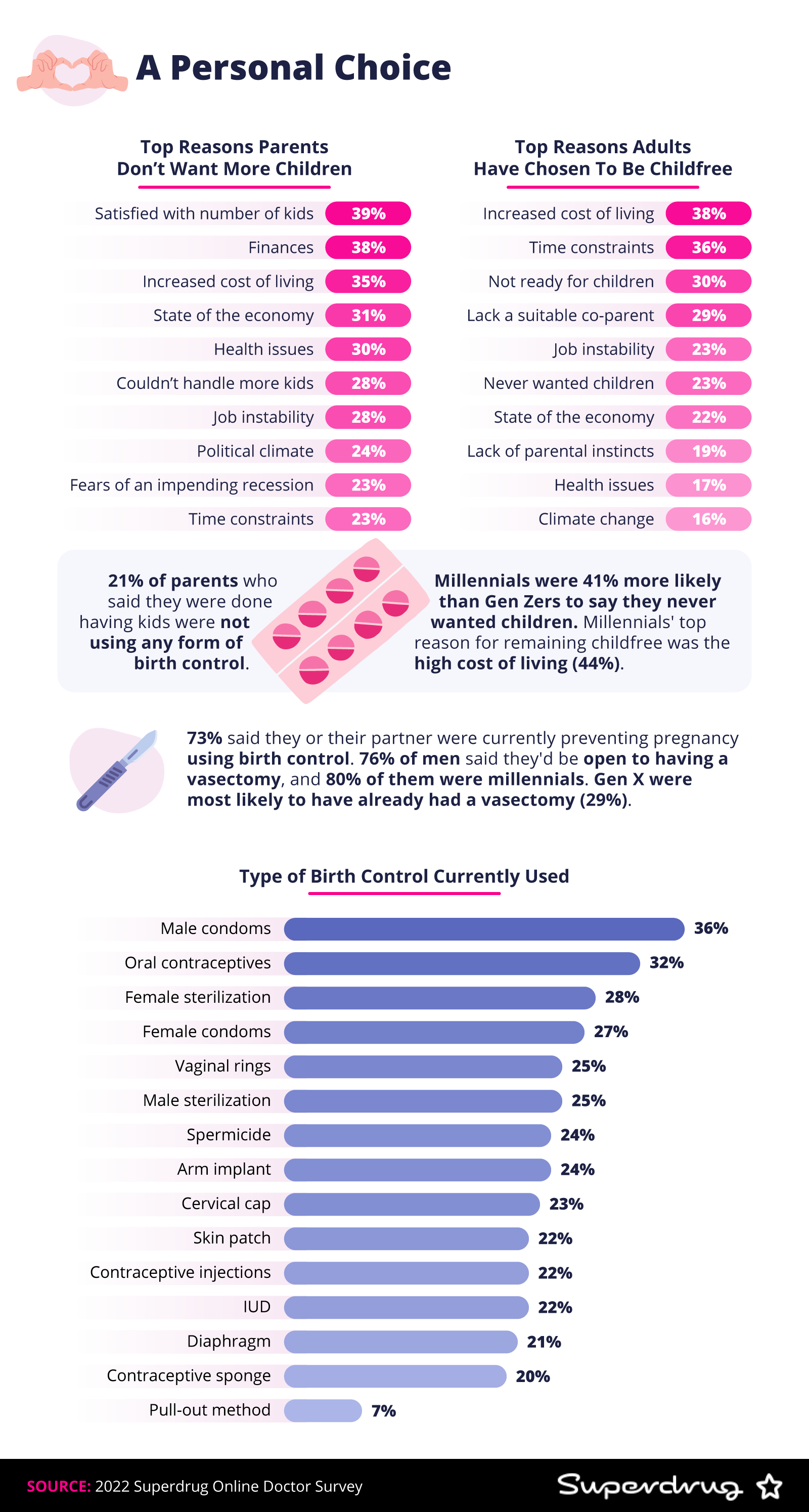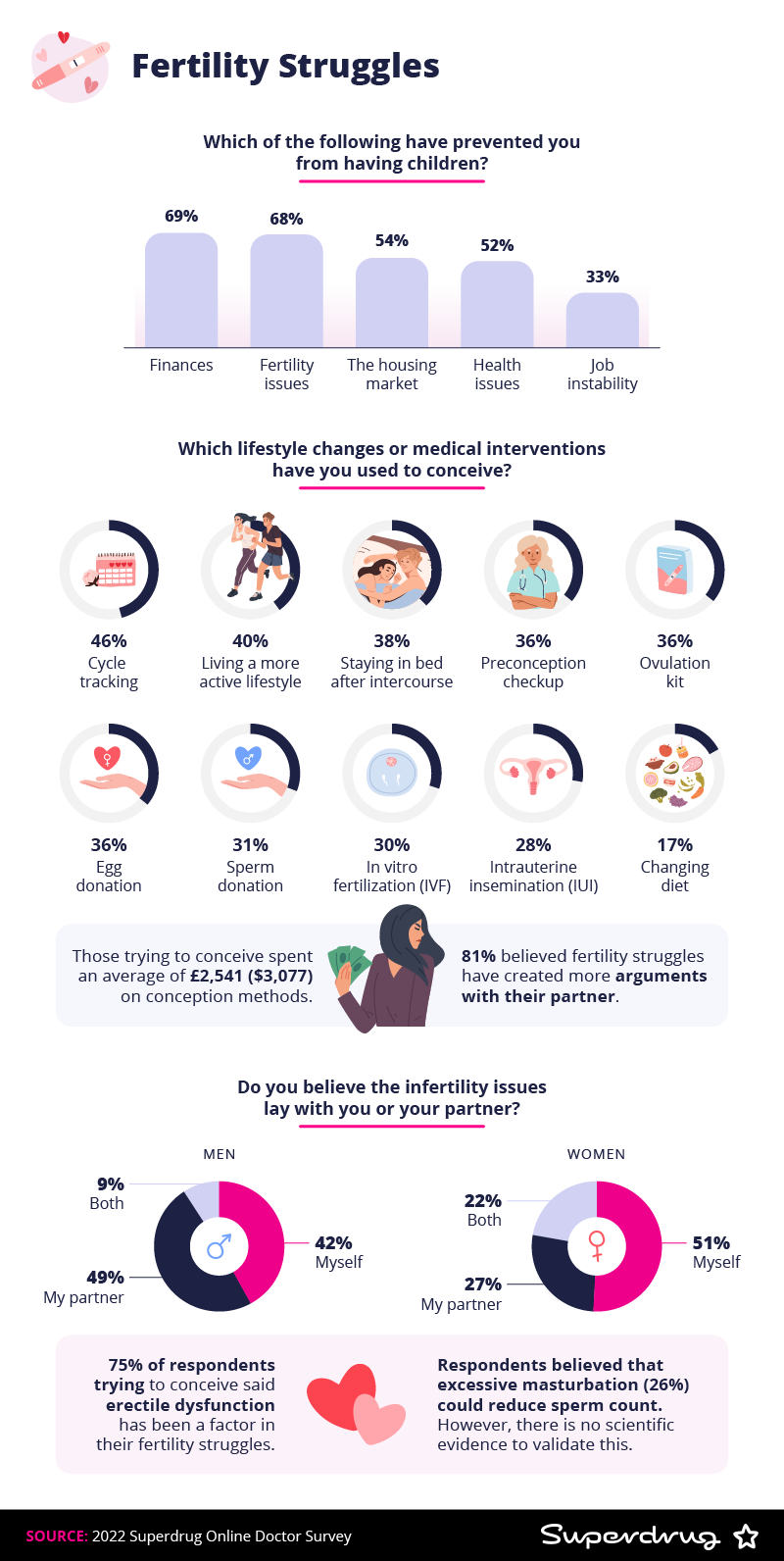
Finances and Fertility Issues at the Heart of Family Planning
Modern fertility is a complex story set against a challenging backdrop, and everyone's experience is different. Concerns like climate change, partner issues, and financial troubles can make it difficult to want to bring children into this world. But when people choose to start a family, fertility struggles (for both men and women) can get in the way of their deepest desires.
So, how are couples choosing to either avoid or achieve pregnancy? What challenges are they facing, and have they found any solutions? Keep reading to see how over 1,000 people of all generations answered these questions and more.
Key Takeaways
- Millennials' top reason for remaining childfree is the high cost of living (44%).
- 76% of men would opt for a vasectomy if they weren't interested in having more children.
- 75% of respondents trying to conceive say erectile dysfunction has been a factor in their fertility struggles.
- 26% of respondents believe excessive masturbation could reduce sperm count; however, there's no scientific evidence to validate this.
Why People Don't Have Children
In this section, we'll explore why people have chosen not to have more children or any children at all. How many are willing to undergo sterilisation? What other forms of birth control are they using? Let's take a look.

High levels of inflation and recent mass layoffs in the tech industry, it's understandable that the single greatest barrier to having children was the cost of modern life. Over one-third (38%) reported that increased expenses have stopped them from having kids – they simply can't afford it. As many as 36% felt they had no time for children. Perhaps it's because they're devoted to their careers, or maybe, they're too busy fulfilling other responsibilities and working to survive the current economic climate.
The top reason Gen Xers chose to stay childfree was that they didn't have a partner they wanted to co-parent with (43%). They were also the most likely to cite job instability (32%). Among parents who chose not to expand their families, millennials were most likely to cite finances (46%), while Gen Z parents were most likely to hold off on having more kids because they feared an impending recession (32%).
Millennials were 41% more likely than Gen Z to say they never wanted children. Remaining childfree has been a popular choice for millennials as they consider the world's current unsteady conditions. Since they're younger, Gen Zers may have more optimistic sentiments for the future that reflect their wishes to build a family one day.
Most men (76%) were willing to have a vasectomy to prevent unwanted pregnancies; however, only 1 in 4 respondents said that they or their partner had undergone the procedure. Female sterilisation was more common than vasectomies despite requiring a much more invasive surgery. One reason for this may be that mothers can opt to have the procedure done after a caesarean birth while they're already under medical care.
Trying To Get Pregnant Today
Many people want to grow or start a family. But even with modern medical treatments, fertility struggles are very common. This next part of our study focuses on what prevents people from having children, what people do to increase fertility, and how trying to conceive impacts relationships.

People with reproductive health conditions like polycystic ovary syndrome (PCOS), which affects the release of eggs, may have more trouble conceiving than others. But fertility struggles can include more than a person's health. Most respondents – almost 70% – considered financial troubles the top barrier to pregnancy, making it an even more common issue than troubles with biological fertility.
Lifestyle choices can also affect starting or growing a family. Many respondents understood that menstrual cycle tracking and maintaining an active lifestyle could help them conceive and that cigarettes and alcohol could decrease their chances by reducing sperm count. But regardless of lifestyle, men will see some reduction in sperm motility as they age. Sperm tests can help men get a better idea of how healthy their sperm is.
Another thing for men to consider if they're looking to conceive is their level of testosterone – a hormone that can affect male fertility. Women may want to check their progesterone levels for the same reason.
Unfortunately, when fertility struggles occurred, women were more likely to blame themselves compared to men. To make matters worse, men were 17% more likely to blame their partners than themselves. Male infertility may be a sensitive topic for men, but it's nothing to be ashamed of: erectile dysfunction (ED) has caused fertility issues for 75% of respondents. ED is a common and treatable health condition that's especially common in men over 40. If you or your partner have any concerns, private at-home ED test kits are available.
Of those who said ED wasn't a problem, only 1 in 4 were millennials, indicating that it's not just a problem for older men. ED can happen at any age, although it can become more common later in life. Medications and lifestyle changes such as eating healthier, exercising, and reducing stress can help to alleviate it.
Perhaps this dichotomy was one reason why 81% of people said fertility struggles caused more arguments within their relationship. It's likely that so, too, has the financial strain of trying to conceive: respondents have spent an average of £2,541 ($3,077) on conception methods. Fertility issues coupled with the high cost of living would certainly make it difficult for many hopeful parents to afford to start or grow a family.
Optimism for the Future
Fertility issues will challenge individuals in many ways, so it's important to address both the physical and emotional impacts that such challenges can bring. Managing stress in a nurturing manner is key because it directly affects the balance of our hormones. Several lifestyle changes can be implemented to facilitate this transition. One should consider developing a wholesome diet and movement routine, along with other holistic practices to keep your nervous system in check. Individuals and couples may also choose to seek therapy as a way to release and shift debilitating perspectives.
At the doctor's office, practitioners can help you develop a plan after proper diagnosis suitable to your body. There are several treatments that can target relevant conditions in both men and women to support their needs and challenges.
Choosing Your Own Family Path
Others' experiences can be helpful, but you don't have to make the same choices when starting or growing your own family. Fertility is a complex and sensitive issue, however, progress begins with awareness. Fertility testing (for both men and women) can help people to understand their bodies better. Seeking personal and medical support along your journey is also important. A range of treatments are available to handle common conditions, and we're here to help you find solutions today.
Methodology
Superdrug Online Doctor surveyed 1,146 people to explore their fertility experiences. Respondents included 815 women and 331 men. The margin of error for this sample size is plus or minus 3%, with a confidence level of 95%.
About Superdrug Online Doctor
Superdrug is online medical care where and when you need it. All prescription medicines and test kit orders are clinically reviewed within a few hours and can be available the same day.
Fair Use Statement
Fertility can be a sensitive conversation, but it's worth having. If you think your audience would benefit from the findings of this study, you're welcome to share our work as long as your purposes are noncommercial and you provide a link to our research.